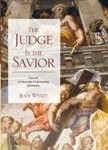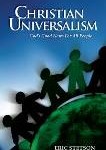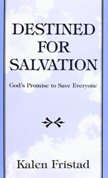There’s no greater joy than sharing Gods love for all people. Some of the articles on this website have been converted into tracts and some are from other CU websites. Please feel free to download, print and distribute as the Lord leads. They can be professionally printed or using your home printer, print using duplex format or single print then turn, reverse and reprint, so the finished product is a double sided tract.
Recommended Tracts for non believers and mainstream Christians
The Beauty of Christian Universalism
God’s Purpose in Creation By Joseph Kirk
GOD’S GREAT LOVE by Adolph Ernst Knoch
The Good News Gospel by Adolph Ernst Knoch
God’s Salvation of All Unbelievers by Adolph Ernst Knoch
The Utter Simplicity of the Gospel by Ted Jones
God Will Save Everyone! by Martin Lee
The Glorious Gospel by Jan Antonsson
It Is Inevitable by Lee Salisbury
Adam succeeded will Christ by Gary Amirault
Is Hell Eternal, What Does the Bible Say – Brochure by Bob Evely
What is Christian Universalism
AVOID RELIGION AT ALL COSTS street tract
For those living in the United Kingdom; Birmingham Gospel Outreach and the Revival Movement Association offer a few tracts which may be considered safe, non-intrusive and have some CU content
http://www.birminghamgospeloutreach.co.uk/
http://www.revivalmovement.org/
You can obtain free copies of Gerry Beauchemin’s highly acclaimed book Hope Beyond Hell from his website. There is a small fee for shipping and handling.
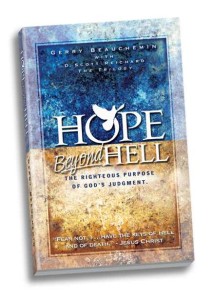 Have you been tormented by the thought of dying? Do you know the anguish of thinking that you or a loved one might suffer in hell forever? You are not alone. Hope Beyond Hell assures us of a Love that never gives up on us no matter how miserably we fail. Gerry Beauchemin and Scott Reichard make a compelling Biblical case affirming all God’s judgments have a good and remedial Purpose
Have you been tormented by the thought of dying? Do you know the anguish of thinking that you or a loved one might suffer in hell forever? You are not alone. Hope Beyond Hell assures us of a Love that never gives up on us no matter how miserably we fail. Gerry Beauchemin and Scott Reichard make a compelling Biblical case affirming all God’s judgments have a good and remedial Purpose
http://www.hopebeyondhell.net/order-books/
BOOK RECOMMENDATIONS
Click on the thumbnail to purchase
Flames of Love by Heath Bradley
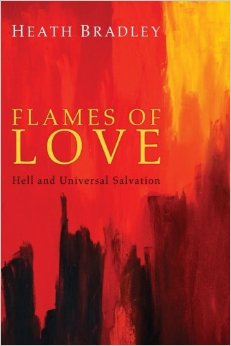 church history, and contemporary philosophy of religion to make the case that Christian universalism is a coherent, compelling, biblical, orthodox option for envisioning the life of the world to come. After offering an introductory exploration and critique of the dominant Christian view of hell, the reader is then guided through chapter-length responses to the major misunderstandings and objections to this position, which are:
church history, and contemporary philosophy of religion to make the case that Christian universalism is a coherent, compelling, biblical, orthodox option for envisioning the life of the world to come. After offering an introductory exploration and critique of the dominant Christian view of hell, the reader is then guided through chapter-length responses to the major misunderstandings and objections to this position, which are:- Universalists don’t believe in hell.
- Universalists don’t believe the Bible. Universalists deny human freedom.
- Universalists think all religions are equally true.
- Universalists have no motivation for evangelism.
- Universalists have no motivation for holy living.
The Inescapable Love of God by Thomas Talbott
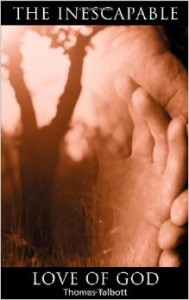 From the Preface: “This set of reflections is neither a textbook nor a piece of scholarly research. It neither summarizes a specific field of study for students nor advances scholarship in some area of research. It is instead (what I would call) a real book, by which I mean that in it I have tried to reach the most demanding audience of all: that of educated non-specialists. The book is in part an intellectual autobiography, in part the elaboration of an argument, and in part an attempt at persuasive writing. In these pages, I have sought to share with others, particularly those who call themselves “Christians,” some of my own deepest convictions about the nature of God and the world. I have sought to work out, with some degree of consistency, the idea that the universe really is an expression of love, as some of the mystics from many traditions have always insisted.”
From the Preface: “This set of reflections is neither a textbook nor a piece of scholarly research. It neither summarizes a specific field of study for students nor advances scholarship in some area of research. It is instead (what I would call) a real book, by which I mean that in it I have tried to reach the most demanding audience of all: that of educated non-specialists. The book is in part an intellectual autobiography, in part the elaboration of an argument, and in part an attempt at persuasive writing. In these pages, I have sought to share with others, particularly those who call themselves “Christians,” some of my own deepest convictions about the nature of God and the world. I have sought to work out, with some degree of consistency, the idea that the universe really is an expression of love, as some of the mystics from many traditions have always insisted.”
Spiritual Terrorism: Spiritual Abuse From The Womb To The Tomb, by Boyd C. Purcell Ph.D.
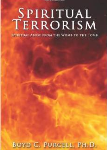 Spiritual Terrorism is about the impact of fear-based religion on people’s lives who have been spiritually abused by a negative conception of God through eternal hell-fire preaching and teaching. The doctrine of eternal punishment in literal fire is at the heart of many forms of spiritual abuse and all forms of spiritual terrorism which is the most extreme form of spiritual abuse. This book effectively explains the symbolic use of fire in the Holy Bible and other Holy Books. The common misunderstanding of the metaphorical usage of fire is the primary cause of spiritual terrorism.
Spiritual Terrorism is about the impact of fear-based religion on people’s lives who have been spiritually abused by a negative conception of God through eternal hell-fire preaching and teaching. The doctrine of eternal punishment in literal fire is at the heart of many forms of spiritual abuse and all forms of spiritual terrorism which is the most extreme form of spiritual abuse. This book effectively explains the symbolic use of fire in the Holy Bible and other Holy Books. The common misunderstanding of the metaphorical usage of fire is the primary cause of spiritual terrorism.
Universalism, the Prevailing Doctrine of the Christian Church During Its First Five Hundred Years by John Wesley Hanson
This book is exactly what it says it is, a review of the first five hundred years of the church, and the various evidences for Universalism being the prevailing doctrine. The writer makes the case well, going through the early centuries chronologically and charting the course of Christian sentiment. Needless to say, the pivotal earthly figures in the drama are Origen on the side of Universalism and Augustine as the 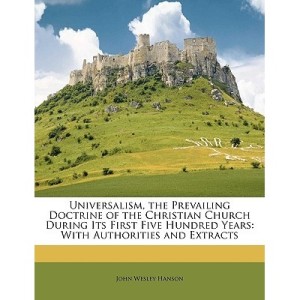 austere Latin speaker who brought down the hammer of condemnation upon the sweetness of the Koine gospel. Indeed, one of the many important thrusts to Hanson’s narrative is the fact that the early Greek speakers understood ‘aionion’ to have a meaning other than absolute endlessness, and that the later Latin leaders misunderstand those words, and others. He compellingly makes the case that the early Greek leaders could hardly have misunderstood a word in their own native tongue.
austere Latin speaker who brought down the hammer of condemnation upon the sweetness of the Koine gospel. Indeed, one of the many important thrusts to Hanson’s narrative is the fact that the early Greek speakers understood ‘aionion’ to have a meaning other than absolute endlessness, and that the later Latin leaders misunderstand those words, and others. He compellingly makes the case that the early Greek leaders could hardly have misunderstood a word in their own native tongue.
Another layer of attention is given to the fact that Universalism was nowhere denounced in those early centuries, even when various prominent figures were compiling and publishing various lists of heresies at the same time that outspoken Universalists such as Origen, Clement, and Gregory Nyssa were in the public eye, without this truth being mentioned in any of the lists at any time. There are many more interesting and revealing points made by the author throughout the work, and he does a masterful job at showing how the belief in Christ’s atoning sacrifice being ultimately triumphant over all only began to die when the light of the Greek speaking church era gave way to the long Latin night. Indeed, he had me chuckling out loud – though ruefully, when he writes “It seems to have been the fashion with the ancient Latin theologians to burn the books they could not refute.” For anyone who has already seen the wonderful reality of God’s ultimate purpose of being “all in all” in the scriptures, this work will add another dimension of evidence. For anyone who does not necessarily believe, but would like to examine the cases for and against the ultimate salvation of all, this would be useful also, especially as a companion to a book explaining the truth from the scriptures themselves.
The Judge Is the Savior: Towards a Universalist Understanding of Salvation by Jean Wyatt
This is a book Jean Wyatt felt compelled to write, as she has for many years wrestled with questions surrounding the love and the justice of God, his salvation and judgment through Jesus Christ, and the effect of our response (or lack of response) to that salvation.
The Bible gives glimpses of hope that in the end God will restore all things, and that finally all people will worship him. If it is God’s will that all should be saved, is it possible to resist that will for all eternity? Or dare we hope that God will continue to seek and ultimately save those who now reject his offered salvation? Dare we hope that hell will be a place of restorative justice and cleansing, with redemption as its aim? Wyatt has come to the conclusion that we can answer “Yes” to both these questions. The fire of God consumes evil and cleanses people.
Meanwhile, in the here and now in which we live as disciples of Jesus Christ, we are called to be witnesses to the kingdom of God and to work for his kingdom to come “on earth as it is in heaven.”
The Evangelical Universalist, by Gregory Macdonald
Can an orthodox Christian, committed to the historic faith of the Church and the authority of the Bible, be a universalist? Is it possible to believe that salvation is found only by grace, through faith in Christ, and yet to maintain that in the end all people will be saved? Can one believe passionately in mission if one does not think that anyone will be lost forever? Could universalism be consistent with the teachings of the Bible? This book argues that the answer is ‘yes’ to all of these questions. Weaving together philosophical, theological and biblical considerations, the author shows that being a universalist is consistent with the central teachings of the Bible and of historic Christian theology.
Christian Universalism: God’s Good News for All People, by Eric Stetson
An introduction to Christian Universalism, the belief that Christ is the Savior of all mankind. An exploration of the biblical, historical and theological arguments for the doctrine that all will be saved in the end.
Destined for Salvation: God’s Promise to Save Everyone by Kalen Fristed
God will not abandon lost people, in this life or the next, but will continue to work for their conversion and transformation until everyone is saved. This view was widely held by early Christians, and is supported by many passages of Scripture and by the contention that God is more patient, loving and forgiving than human parents who would not punish their own children without end. This is important because the teaching of a God of eternal damnation causes many people to reject God and consequently experience hell. On the other hand, the message of an unconditionally loving, forgiving and saving God leads many previously disillusioned people to cheerfully embrace God. Also, people’s perceptiion of God determines how they live their lives. If they believe God is judgmental, vengeful, and unforgiving they can easily justify acting that way themselves. But if they believe God is loving, kind, patient and forgiving, people are more likely to act that way as well.
God’s Final Victory by Eric Reitan
God’s Final Victory addresses the ongoing controversy concerning which doctrine is more defensible: the doctrine of hell or the doctrine of universal salvation. Would the just and loving God of traditional Christianity ever cause or allow some creatures to endure hell, that is, 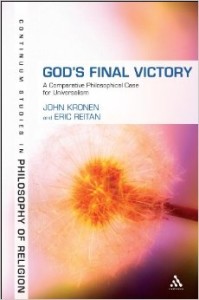 eternal alienation from both God and the blessed? Many think the answer is yes. Some defend this answer by arguing that God is not only loving but also just, and that eternal damnation is sometimes the only way God can meet the demands of justice with respect to sin. Others argue that, out of respect for creatures, God affords them the freedom to choose their destiny-and some choose eternal alienation from God. God’s Final Victory examines the presuppositions underlying both lines of argument and finds that, once understood in their most defensible form, they offer good reason to suppose God would save all if He could and no compelling reason to suppose that He would or could not. As such, even conservative Christians should believe in universal salvation.
eternal alienation from both God and the blessed? Many think the answer is yes. Some defend this answer by arguing that God is not only loving but also just, and that eternal damnation is sometimes the only way God can meet the demands of justice with respect to sin. Others argue that, out of respect for creatures, God affords them the freedom to choose their destiny-and some choose eternal alienation from God. God’s Final Victory examines the presuppositions underlying both lines of argument and finds that, once understood in their most defensible form, they offer good reason to suppose God would save all if He could and no compelling reason to suppose that He would or could not. As such, even conservative Christians should believe in universal salvation.
The Healing the Gospel, by Derek Flood
Why did Jesus have to die? Was it to appease a wrathful God’s demand for punishment? Does that mean Jesus died to save us from 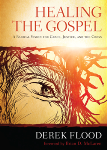 God? How could someone ever truly love or trust a God like that? How can that ever be called “Good News” It’s questions like these that make so many people want to have nothing to do with Christianity. Healing the Gospel challenges the assumption that the Christian understanding of justice is rooted in a demand for violent punishment, and instead offers a radically different understanding of the gospel based on God’s restorative justice. Connecting our own experiences of faith with the New Testament narrative, author Derek Flood shows us an understanding of the cross that not only reveals God’s heart of grace, but also models our own way of Christ-like love. It’s a vision of the gospel that exposes violence, rather than supporting it-a gospel rooted in love of enemies, rather than retribution. The result is a nonviolent understanding of the atonement that is not only thoroughly biblical, but will help people struggling with their faith to encounter grace
God? How could someone ever truly love or trust a God like that? How can that ever be called “Good News” It’s questions like these that make so many people want to have nothing to do with Christianity. Healing the Gospel challenges the assumption that the Christian understanding of justice is rooted in a demand for violent punishment, and instead offers a radically different understanding of the gospel based on God’s restorative justice. Connecting our own experiences of faith with the New Testament narrative, author Derek Flood shows us an understanding of the cross that not only reveals God’s heart of grace, but also models our own way of Christ-like love. It’s a vision of the gospel that exposes violence, rather than supporting it-a gospel rooted in love of enemies, rather than retribution. The result is a nonviolent understanding of the atonement that is not only thoroughly biblical, but will help people struggling with their faith to encounter grace
Christian Universalism, Maybe God Isn’t Such A Bad Guy After All, by Richard Harold Goyette
In this book I provide convincing Scriptural support for the doctrine of “Universal Reconciliation,” also known as “Christian Universalism.” Many other related issues are also discussed, including the nature of Christian salvation, the purpose of God’s judgments, predestination and free will, the problem of evil, and popular misconceptions about Heaven and Hell. Many evangelical 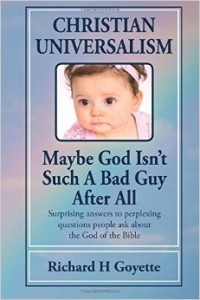 Christian doctrines are contradictory and/or paradoxical in nature. For example, why must unbelievers pay a penalty for sin that was already paid by Christ on the Cross of Calvary? If the penalty is everlasting torment in a place called Hell, how could Christ have possibly paid that penalty? He remained dead for less that three days and is alive today in Heaven. According to Jesus, God commands us to return good for evil and forgive our enemies, because that is what God is like. If God refuses to forgive His enemies and tortures them forever in Hell, wouldn’t that make God the greatest hypocrite of all time? How could God be both loving and unimaginably cruel and hateful at the same time? The word in the New Testament that is translated “eternal” and “everlasting” actually means quite the opposite. The Greek word “aionias” means “age-enduring” or “pertaining to an age or ages.” Why is this word and all of its derivatives mistranslated in most modern Bible versions? The doctrine of universal reconciliation was the prevailing view of the Christian Church and most of the Church Fathers during the first five centuries of the Church’s existence. Why is this doctrine almost never taught in the Church today? In this book I provide surprising and satisfying answers from the Scriptures to all of these questions and many more. If you are at least hopeful that I am right about God’s unconditional love for all mankind and His intention to redeem us all from sin and death, then you will absolutely love this book. Contrary to popular belief, there is overwhelming support in the Scriptures for the doctrine of Universal Reconciliation. May God bless you as you read this book and seek a closer walk with God
Christian doctrines are contradictory and/or paradoxical in nature. For example, why must unbelievers pay a penalty for sin that was already paid by Christ on the Cross of Calvary? If the penalty is everlasting torment in a place called Hell, how could Christ have possibly paid that penalty? He remained dead for less that three days and is alive today in Heaven. According to Jesus, God commands us to return good for evil and forgive our enemies, because that is what God is like. If God refuses to forgive His enemies and tortures them forever in Hell, wouldn’t that make God the greatest hypocrite of all time? How could God be both loving and unimaginably cruel and hateful at the same time? The word in the New Testament that is translated “eternal” and “everlasting” actually means quite the opposite. The Greek word “aionias” means “age-enduring” or “pertaining to an age or ages.” Why is this word and all of its derivatives mistranslated in most modern Bible versions? The doctrine of universal reconciliation was the prevailing view of the Christian Church and most of the Church Fathers during the first five centuries of the Church’s existence. Why is this doctrine almost never taught in the Church today? In this book I provide surprising and satisfying answers from the Scriptures to all of these questions and many more. If you are at least hopeful that I am right about God’s unconditional love for all mankind and His intention to redeem us all from sin and death, then you will absolutely love this book. Contrary to popular belief, there is overwhelming support in the Scriptures for the doctrine of Universal Reconciliation. May God bless you as you read this book and seek a closer walk with God
Dropping hell and embracing grace by Ivan A Rogers
Dropping hell and embracing grace is a call for a reconsideration of the scope of god’s recovery plan for his fallen creation. Does he intend to recover all, or will he settle for less than all? That is the question! The author, Ivan A. Rogers, takes the affirmative position on the above issues. He makes a compelling and scripture-based case that, when finally embraced, will result in the greatest 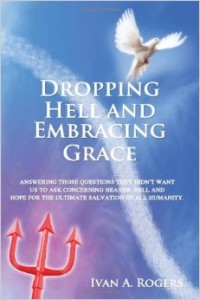 reformation of positive change yet experienced by the church Christ founded. Rogers brilliantly takes the reader on a spiritual journey that actually began even “before the world was made.” He convincingly demonstrates that God’s ultimate objective is the salvation of all humanity from Adam forward to a glorious future of promise. This being true, the doctrine of eternal conscious torture in a so-called “hell” becomes a casualty of God’s all-encompassing grace. “Ivan A. Rogers’ book is essential reading for everyone who desires to understand God’s plan of salvation of all humanity. Boldly tackling the key issues regarding universal reconciliation, this book provides clear, succinct explanations. ‘Dropping Hell and Embracing Grace’ is solidly based upon Scripture and honors the Word of God above human opinion or religious tradition. Read it — and be challenged to think deeply about the world-changing grace of our Lord Jesus Christ” (endorsement by Steven Fuson, author of Temple Treasures, also, Kingdom and Dominion
reformation of positive change yet experienced by the church Christ founded. Rogers brilliantly takes the reader on a spiritual journey that actually began even “before the world was made.” He convincingly demonstrates that God’s ultimate objective is the salvation of all humanity from Adam forward to a glorious future of promise. This being true, the doctrine of eternal conscious torture in a so-called “hell” becomes a casualty of God’s all-encompassing grace. “Ivan A. Rogers’ book is essential reading for everyone who desires to understand God’s plan of salvation of all humanity. Boldly tackling the key issues regarding universal reconciliation, this book provides clear, succinct explanations. ‘Dropping Hell and Embracing Grace’ is solidly based upon Scripture and honors the Word of God above human opinion or religious tradition. Read it — and be challenged to think deeply about the world-changing grace of our Lord Jesus Christ” (endorsement by Steven Fuson, author of Temple Treasures, also, Kingdom and Dominion
Her Gates Will Never Be Shut: Hell, Hope, and the New Jerusalem, by Bradley Jersak.
Description: Everlasting hell and divine judgment, a lake of fire and brimstone–these mainstays of evangelical tradition have come under fire once again in recent decades. Would the God of love revealed by Jesus really consign the vast majority of humankind to a destiny of eternal, conscious torment? Is divine mercy bound by the demands of justice? How can anyone presume to know who is saved from the flames and who is not? Reacting to presumptions in like manner, others write off the fiery images of final judgment altogether. If there is a God who loves us, then surely all are welcome into the heavenly kingdom, regardless of their beliefs or behaviors in this life. Yet, given the sheer volume of threat rhetoric in the Scriptures and the wickedness manifest in human history, the pop-universalism of our day sounds more like denial than hope. Mercy triumphs over judgment; it does not skirt it. Her Gates 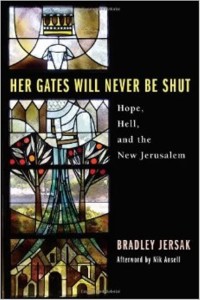 Will Never Be Shut endeavors to reconsider what the Bible and the Church have actually said about hell and hope, noting a breadth of real possibilities that undermines every presumption. The polyphony of perspectives on hell and hope offered by the prophets, apostles, and Jesus humble our obsessive need to harmonize every text into a neat theological system. But they open the door to the eternal hope found in Revelation 21-22: the City whose gates will never be shut; where the Spirit and Bride perpetually invite the thirsty who are outside the city to “Come, drink of the waters of life.” Endorsements: “Who are the damned? Who are the saved? The questions have a way of provoking controversy, often quite heated. Brad Jersak, self-identified as an evangelical who accepts the Biblical witness as authoritative, turns the controversy into a conversation, a quiet conversation. He listens. He listens to opposing voices. He listens to Scripture as God’s last word on the subject. He listens to the scholars and theologians. Out of the listening something like a ‘humility of hope’ (Jersak’s phrase) begins to replace dogmatisms and we find ourselves part of a conversation with Christian brothers and sisters who are seriously praying for the world’s salvation.” –Eugene H. Peterson author of Tell It Slant: A Conversation on the Language of Jesus in His Stories and Prayers “Deeply grounded in evangelical faith and committed to evangelical categories of theological interpretation, Jersak probes the meaning of ‘Final Judgment’ in Christian faith and tradition. The phrase, for Jersak, must be kept in quote marks, because he sees that what is ‘final’ is not ‘judgment’ but the openness of God. The book traces the way in which Christians, and the author, ‘exchange certainty for hope.’ In the end the residue of evil will not have the last word; what prevails is the goodness of God’s love. Readers will be greatly instructed by this thoughtful book.” –Walter Brueggemann author of Divine Presence Amid Violence (Cascade, 2009) “Combining theological rigor and pastoral sensitivity Her Gates Will Never Be Shut is sure to push the boundaries of the contemporary theological landscape and expand the theological horizons of scholars, pastors, and lay Christians alike. Grounded, timely, and open–this is evangelical theology at its best.” –Jon Stanley co-editor of “God is Dead” and I Don’t Feel so Good Myself: Theological Engagements with the New Atheism (Cascade, 2009) About the Contributor(s): Bradley Jersak is an author and seminar speaker based in Abbotsford, British Columbia. He is the author of Can You Hear Me? (2003), Kissing the Leper (2006), and co-editor of Stricken by God? (2007).
Will Never Be Shut endeavors to reconsider what the Bible and the Church have actually said about hell and hope, noting a breadth of real possibilities that undermines every presumption. The polyphony of perspectives on hell and hope offered by the prophets, apostles, and Jesus humble our obsessive need to harmonize every text into a neat theological system. But they open the door to the eternal hope found in Revelation 21-22: the City whose gates will never be shut; where the Spirit and Bride perpetually invite the thirsty who are outside the city to “Come, drink of the waters of life.” Endorsements: “Who are the damned? Who are the saved? The questions have a way of provoking controversy, often quite heated. Brad Jersak, self-identified as an evangelical who accepts the Biblical witness as authoritative, turns the controversy into a conversation, a quiet conversation. He listens. He listens to opposing voices. He listens to Scripture as God’s last word on the subject. He listens to the scholars and theologians. Out of the listening something like a ‘humility of hope’ (Jersak’s phrase) begins to replace dogmatisms and we find ourselves part of a conversation with Christian brothers and sisters who are seriously praying for the world’s salvation.” –Eugene H. Peterson author of Tell It Slant: A Conversation on the Language of Jesus in His Stories and Prayers “Deeply grounded in evangelical faith and committed to evangelical categories of theological interpretation, Jersak probes the meaning of ‘Final Judgment’ in Christian faith and tradition. The phrase, for Jersak, must be kept in quote marks, because he sees that what is ‘final’ is not ‘judgment’ but the openness of God. The book traces the way in which Christians, and the author, ‘exchange certainty for hope.’ In the end the residue of evil will not have the last word; what prevails is the goodness of God’s love. Readers will be greatly instructed by this thoughtful book.” –Walter Brueggemann author of Divine Presence Amid Violence (Cascade, 2009) “Combining theological rigor and pastoral sensitivity Her Gates Will Never Be Shut is sure to push the boundaries of the contemporary theological landscape and expand the theological horizons of scholars, pastors, and lay Christians alike. Grounded, timely, and open–this is evangelical theology at its best.” –Jon Stanley co-editor of “God is Dead” and I Don’t Feel so Good Myself: Theological Engagements with the New Atheism (Cascade, 2009) About the Contributor(s): Bradley Jersak is an author and seminar speaker based in Abbotsford, British Columbia. He is the author of Can You Hear Me? (2003), Kissing the Leper (2006), and co-editor of Stricken by God? (2007).
Beyond Retribution: A New Testament Vision for Justice, Crime, and Punishment, by Christopher D. Marshall.
Recently a growing number of Christians have actively promoted the concept of “restorative justice” and attempted to develop programs 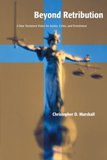 for dealing with crime based on restorative principles. But is this approach truly consistent with the teaching of Scripture? To date, very little has been done to test this claim. Beyond Retribution fills a gap by plumbing the New Testament on the topics of crime, justice, and punishment. Christopher Marshall first explores the problems involved in applying ethical teachings from the New Testament to mainstream society. He then surveys the extent to which the New Testament addresses criminal justice issues, looking in particular at the concept of the justice of God in the teachings of Paul and Jesus. He also examines the topic of punishment, reviewing the debate in social thinking over the ethics and purpose of punishment-including capital punishment-and he advocates a new concept of “restorative punishment.” The result of this engaging work is a biblically based challenge to imitate the way of Christ in dealing with both victims and offenders.
for dealing with crime based on restorative principles. But is this approach truly consistent with the teaching of Scripture? To date, very little has been done to test this claim. Beyond Retribution fills a gap by plumbing the New Testament on the topics of crime, justice, and punishment. Christopher Marshall first explores the problems involved in applying ethical teachings from the New Testament to mainstream society. He then surveys the extent to which the New Testament addresses criminal justice issues, looking in particular at the concept of the justice of God in the teachings of Paul and Jesus. He also examines the topic of punishment, reviewing the debate in social thinking over the ethics and purpose of punishment-including capital punishment-and he advocates a new concept of “restorative punishment.” The result of this engaging work is a biblically based challenge to imitate the way of Christ in dealing with both victims and offenders.
Raising Hell: Christianity’s Most Controversial Doctrine Put Under Fire, by Julie Ferwerda.
Have you ever considered the apparent injustices, inconsistencies, and even contradictions of the doctrine of hell? For starters, do earthly parents love their children more than God? Does God ask you to forgive your enemies when He is not willing to do the same? Is being 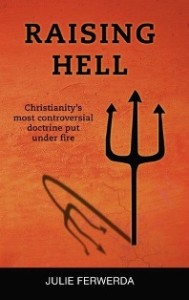 punished forever for sins committed in a short lifetime really “justice”? Does everybody really get the same fair chance to believe in Jesus before they die? If hell is the worst possible fate of mankind, and if God is truly loving, then…
punished forever for sins committed in a short lifetime really “justice”? Does everybody really get the same fair chance to believe in Jesus before they die? If hell is the worst possible fate of mankind, and if God is truly loving, then…
Why did He fail to mention hell in Genesis as the price for sin?
Why doesn’t the Old Testament ever teach about or even mention hell?
Why doesn’t Paul, the apostle to the non-Jewish world, ever once mention hell?
Why was hell not the orthodox position of the early Church for five centuries after Christ?
Why can’t theologians agree if we are saved by election or free will?
Why has orthodox Judaism (to whom Scriptures were given) never believed in any kind of eternal punishment or hell
Dare to question. What have you got to lose? If you’ve ever had doubts or questions about the incompatibility of eternal torment with a merciful God, Raising Hell will open your eyes to a radical view of God’s loving purpose for all humanity and what the “Good News” is really about. Picking up where Rob Bell and others leave off, Julie Ferwerda offers compelling evidence historically, philosophically, and scripturally as to why the doctrine of eternal torment is the biggest and most damaging deception of the modern Church.
All Shall Be Well: Explorations in Universal Salvation and Christian Theology, from Origen to Moltmann
All shall be well, and all shall be well, and all manner of thing shall be well Lady Julian of Norwich Universalism runs like a slender thread through the history of Christian theology. It has always been a minority report and has often been regarded as heresy, but it has proven to  be a surprisingly resilient “idea” Over the centuries Christian universalism, in one form or another, has been reinvented time and time again. In this book an international team of scholars explore the diverse universalisms of Christian thinkers from the Origen to Moltmann. In the introduction Gregory MacDonald argues that theologies of universal salvation occupy a space between heresy and dogma. Therefore disagreements about whether all will be saved should not be thought of as debates between “the orthodox” and “heretics” but rather as “in-house” debates between Christians. The studies that follow aim, in the first instance, to hear, understand, and explain the eschatological claims of a range of Christians from the third to the twenty-first centuries. They also offer some constructive, critical engagement with those claims. Origen (Tom Greggs) Gregory of Nyssa (Steve Harmon) Julian of Norwich (Robert Sweetman) The Cambridge Platonists (Louise Hickman) James Relly (Wayne K. Clymer) Elhanan Winchester (Robin Parry) Friedrich Schleiermacher (Murray Rae) Thomas Erskine (Don Horrocks) George MacDonald (Thomas Talbott) P. T. Forsyth (Jason Goroncy) Sergius Bulgakov (Paul Gavrilyuk) Karl Barth (Oliver Crisp) Jaques Ellul (Andrew Goddard) J. A. T. Robinson (Trevor Hart) Hans Urs von Balthasar (Edward T. Oakes, SJ) John Hick (Lindsay Hall) Jürgen Moltmann
be a surprisingly resilient “idea” Over the centuries Christian universalism, in one form or another, has been reinvented time and time again. In this book an international team of scholars explore the diverse universalisms of Christian thinkers from the Origen to Moltmann. In the introduction Gregory MacDonald argues that theologies of universal salvation occupy a space between heresy and dogma. Therefore disagreements about whether all will be saved should not be thought of as debates between “the orthodox” and “heretics” but rather as “in-house” debates between Christians. The studies that follow aim, in the first instance, to hear, understand, and explain the eschatological claims of a range of Christians from the third to the twenty-first centuries. They also offer some constructive, critical engagement with those claims. Origen (Tom Greggs) Gregory of Nyssa (Steve Harmon) Julian of Norwich (Robert Sweetman) The Cambridge Platonists (Louise Hickman) James Relly (Wayne K. Clymer) Elhanan Winchester (Robin Parry) Friedrich Schleiermacher (Murray Rae) Thomas Erskine (Don Horrocks) George MacDonald (Thomas Talbott) P. T. Forsyth (Jason Goroncy) Sergius Bulgakov (Paul Gavrilyuk) Karl Barth (Oliver Crisp) Jaques Ellul (Andrew Goddard) J. A. T. Robinson (Trevor Hart) Hans Urs von Balthasar (Edward T. Oakes, SJ) John Hick (Lindsay Hall) Jürgen Moltmann
The Golden Thread: God’s Promise of Universal Salvation, by Ken Vincent
The Golden Thread God’s Promise of Universal Salvation. In our modern pluralistic world, the barriers imposed by the old doctrine of religious exclusivity are confronted every day by individuals, families, and nations. Now more than ever, the inspirational message of God’s 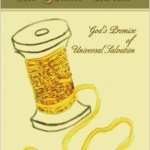 Universal and eternal love for all humanity needs to be retold. By reacquainting readers with the God who is too good to condemn anyone to Eternal Hell, The Golden Thread, God’s Promise of Universal Salvation offers a Biblical interpretation present in Christianity from the earliest Jesus-Followers to the 21st Century. Salvation for all is known as Universalism, and the idea that all people will be saved-either immediately or eventually-is called Universal Restoration. Proponents of Universalism can be found today within a wide variety of denominations from post-Vatican II Catholics to Primitive Baptists. The Golden Thread brings together the Bible verses that ancient and modern Universalist theologians have used to show that God is the parent of all and, in the end, will save the “Lost Sheep” and the “Prodigal Son.” The Golden Thread continues with 2,000 years of Christian mystical religious experience and modern-day near-death experiences-testimony to God’s abiding love for all.
Universal and eternal love for all humanity needs to be retold. By reacquainting readers with the God who is too good to condemn anyone to Eternal Hell, The Golden Thread, God’s Promise of Universal Salvation offers a Biblical interpretation present in Christianity from the earliest Jesus-Followers to the 21st Century. Salvation for all is known as Universalism, and the idea that all people will be saved-either immediately or eventually-is called Universal Restoration. Proponents of Universalism can be found today within a wide variety of denominations from post-Vatican II Catholics to Primitive Baptists. The Golden Thread brings together the Bible verses that ancient and modern Universalist theologians have used to show that God is the parent of all and, in the end, will save the “Lost Sheep” and the “Prodigal Son.” The Golden Thread continues with 2,000 years of Christian mystical religious experience and modern-day near-death experiences-testimony to God’s abiding love for all.
The Ancient History of Universalism: From the Time of the Apostles, to Its Condemnation in the Fifth General Council, A. D. 553
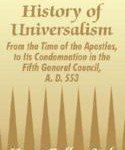 Tracing the history of Universalism from A.D. 90 all the way to A.D. 1500, this is an important volume in the literature of the Universalist Church. Argues that Universalism was widely accepted in the earlier centuries of the Church. Hosea Ballou 2nd (1796-1861) was Tufts University’s first President and its first Professor of History and Intellectual Philosophy. He was the grand-nephew of Hosea Ballou (1771-1851), author of A Treatise on Atonement and prominent early Universalist. In his History of Opinions on the Scriptural Doctrine of Retribution, Edward Beecher said of Ballou’s book, “The work is one of decided ability, and is written with great candor and a careful examination of authorities.”
Tracing the history of Universalism from A.D. 90 all the way to A.D. 1500, this is an important volume in the literature of the Universalist Church. Argues that Universalism was widely accepted in the earlier centuries of the Church. Hosea Ballou 2nd (1796-1861) was Tufts University’s first President and its first Professor of History and Intellectual Philosophy. He was the grand-nephew of Hosea Ballou (1771-1851), author of A Treatise on Atonement and prominent early Universalist. In his History of Opinions on the Scriptural Doctrine of Retribution, Edward Beecher said of Ballou’s book, “The work is one of decided ability, and is written with great candor and a careful examination of authorities.”
Creation’s Jubilee: Kindle Edition
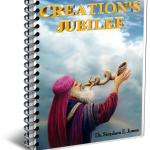 This book deals with the sovereignty of God and the Restoration of All Things, which is God’s overall purpose in history. It also gives little known Church history showing how these vital teachings were lost in the fifth century. It explains the three resurrections of barley, wheat, and grape companies in a general overview.
This book deals with the sovereignty of God and the Restoration of All Things, which is God’s overall purpose in history. It also gives little known Church history showing how these vital teachings were lost in the fifth century. It explains the three resurrections of barley, wheat, and grape companies in a general overview.
Christ Triumphant: Universalism Asserted as the Hope of the Gospel on the Authority of Reason, the Fathers, and Holy Scripture.
In 1885, the Rev. Thomas Allin waded into the debates on final punishment that had plagued the Church of England during the nineteenth 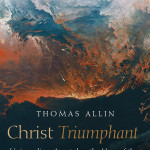 century. His contribution was a radical book that sought to demonstrate that reason, tradition, and Scripture all affirm that God will one day redeem his whole creation through Jesus Christ. Universal salvation, he maintained, was the only way to coherently affirm the victory of God over evil.
century. His contribution was a radical book that sought to demonstrate that reason, tradition, and Scripture all affirm that God will one day redeem his whole creation through Jesus Christ. Universal salvation, he maintained, was the only way to coherently affirm the victory of God over evil.
Allin’s book is one of the first detailed attempts to show that global salvation was not some modern heresy, but an ancient Christian tradition with a serious claim to catholicity and orthodoxy. Turning the tables on the critics, Allin boldly argued that universalism, far from being dangerous, was actually needed to defend the orthodox faith of the church.
This new edition of Allin’s classic work includes an introduction that sets it in its historical context, the addition of subtitles to help readers navigate the argument, and numerous explanatory annotations.
Love Without Limit by Walter Williams
 Love Without Limit’s fresh interpretations of scripture reveal God’s unlimited love, which not only saves everyone eventually, but also gives the best advice for living now, as illustrated by analysis of Christ’s Sermon on the Mount. Written by a Princeton-trained minister and newspaper columnist who majored in psychology, psychological insights show how to overcome anger, insults and condemnation and even benefit from criticism, while learning to love and accept yourself and others. The wisdom about living and explanations about how to achieve a better life make this book valuable for secular, as well as religious, readers.
Love Without Limit’s fresh interpretations of scripture reveal God’s unlimited love, which not only saves everyone eventually, but also gives the best advice for living now, as illustrated by analysis of Christ’s Sermon on the Mount. Written by a Princeton-trained minister and newspaper columnist who majored in psychology, psychological insights show how to overcome anger, insults and condemnation and even benefit from criticism, while learning to love and accept yourself and others. The wisdom about living and explanations about how to achieve a better life make this book valuable for secular, as well as religious, readers.
The Greek Word Aion-Aionios Translated Everlasting-Eternal in the Holy Bible by John Wesley Hanson
A classic work by well known universalist apologist John Wesley Hanson, who wrote in the 1800′s. As the title states, this book deals with the issue of eternity, by examining the Greek words from which the concept is taken. From the preface: The verbal pivot on which swings 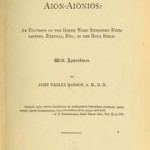 the question, Does the Bible teach the doctrine of Endless Punishment? Is the word Aión and its derivatives and reduplications. The author of this treatise has endeavored to put within brief compass the essential facts pertaining to the history and use of the word, and he thinks he has conclusively shown that it affords no support whatever to the erroneous doctrine. It will generally be conceded that the tenet referred to is not contained in the Scriptures if the meaning of endless duration does not reside in the controverted word. The reader is implored to examine the evidence presented, as the author trusts it has been collected, with a sincere desire to learn the truth
the question, Does the Bible teach the doctrine of Endless Punishment? Is the word Aión and its derivatives and reduplications. The author of this treatise has endeavored to put within brief compass the essential facts pertaining to the history and use of the word, and he thinks he has conclusively shown that it affords no support whatever to the erroneous doctrine. It will generally be conceded that the tenet referred to is not contained in the Scriptures if the meaning of endless duration does not reside in the controverted word. The reader is implored to examine the evidence presented, as the author trusts it has been collected, with a sincere desire to learn the truth
Jesus and Hitler: Salvation For The Worst Of Us, Salvation For All Of Us Through The Savior Of The World
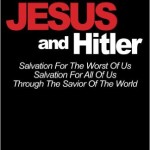 This is a book of hope for all people. The Bible clearly proclaims that God is the Almighty, and that for Him all things are possible. He has given all authority in heaven and earth to His Son, Jesus, the “Savior of the world” (1 John 4:14). Even though the Bible teaches that God “will have all men to be saved, and to come unto the knowledge of the truth” (1 Timothy 2:4), the vast majority in Christianity teach that He and His Son are unable, or unwilling, to save all people. This book will show you that God has good in store for all mankind, even the very worst of us. You will see that God loves His enemies and is willing and able to fulfill all of His good, pleasing and perfect plan. Instead of unbelievers being tormented in hell for eternity, they will go through God’s proper judgment for their sins. His judgment will lead them to bow in love, thankfulness and humility at the feet of their Savior, Jesus.
This is a book of hope for all people. The Bible clearly proclaims that God is the Almighty, and that for Him all things are possible. He has given all authority in heaven and earth to His Son, Jesus, the “Savior of the world” (1 John 4:14). Even though the Bible teaches that God “will have all men to be saved, and to come unto the knowledge of the truth” (1 Timothy 2:4), the vast majority in Christianity teach that He and His Son are unable, or unwilling, to save all people. This book will show you that God has good in store for all mankind, even the very worst of us. You will see that God loves His enemies and is willing and able to fulfill all of His good, pleasing and perfect plan. Instead of unbelievers being tormented in hell for eternity, they will go through God’s proper judgment for their sins. His judgment will lead them to bow in love, thankfulness and humility at the feet of their Savior, Jesus.
This book is full of Scripture and builds a solid argument for Christian Universalism. It is heavy on doctrine and light on philosophy.
The Universalist Movement in America, 1770-1880 (Religion in America)
In this volume Ann Lee Bressler offers the first cultural history of American Universalism and its central teaching — the idea that an all-good and all-powerful God saves all souls. Although Universalists have commonly been lumped together with Unitarians as “liberal religionists,” in its origins their movement was, in fact, quite different from that of the better-known religious liberals.
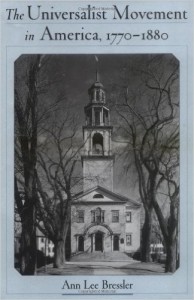 Unlike Unitarians such as the renowned William Ellery Channing, who stressed the obligation of the individual under divine moral sanctions, most early American Universalists looked to the omnipotent will of God to redeem all of creation. While Channing was socially and intellectually descended from the opponents of Jonathan Edwards, Hosea Ballou, the foremost theologian of the Universalist movement, appropriated Edwards’s legacy by emphasizing the power of God’s love in the face of human sinfulness and apparent intransigence. Espousing what they saw as a fervent but reasonable piety, many early Universalists saw their movement as a form of improved Calvinism.
Unlike Unitarians such as the renowned William Ellery Channing, who stressed the obligation of the individual under divine moral sanctions, most early American Universalists looked to the omnipotent will of God to redeem all of creation. While Channing was socially and intellectually descended from the opponents of Jonathan Edwards, Hosea Ballou, the foremost theologian of the Universalist movement, appropriated Edwards’s legacy by emphasizing the power of God’s love in the face of human sinfulness and apparent intransigence. Espousing what they saw as a fervent but reasonable piety, many early Universalists saw their movement as a form of improved Calvinism.
The story of Universalism from the mid-nineteenth century on, however, was largely one of unsuccessful efforts to maintain this early synthesis of Calvinist and Enlightenment ideals. Eventually, Bressler argues, Universalists were swept up in the tide of American religious individualism and moralism; in the late nineteenth century they increasingly extolled moral responsibility and the cultivation of the self. By the time of the first Universalist centennial celebration in 1870, the ideals of the early movement were all but moribund. Bressler’s study illuminates such issues as the relationship between faith and reason in a young, fast-growing, and deeply uncertain country, and the fate of the Calvinist heritage in American religious history.
THE TRIUMPH OF MERCY George Hurd
This book presents the Scriptural and historical basis for the blessed hope of the restoration of all through the universal redemption that was accomplished through Jesus Christ.
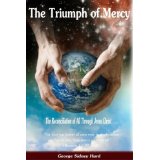 The subject is introduced with the story of my personal journey, beginning with my childhood in a devoutly religious environment in which it was believed that the final destiny for all, except for the best of the best, was annihilation in the lake of fire. Then, considering myself to be beyond hope of salvation, I lived out my teenage years in despair in a life of delinquency and drug addiction until having a life transforming crisis encounter with my Savior Jesus Christ in 1969 when I was eighteen years of age.
The subject is introduced with the story of my personal journey, beginning with my childhood in a devoutly religious environment in which it was believed that the final destiny for all, except for the best of the best, was annihilation in the lake of fire. Then, considering myself to be beyond hope of salvation, I lived out my teenage years in despair in a life of delinquency and drug addiction until having a life transforming crisis encounter with my Savior Jesus Christ in 1969 when I was eighteen years of age.
My journey led me through years attending an Arminian Free Will Baptist Church, then later into Calvinism, doing my studies in a Calvinistic Bible Institute and a Baptist Calvinistic Seminary. In my ministry as a missionary in Colombia I tried to maintain a balance between Arminianism and Calvinism. However I began to see an increasing number of passages which seemed to directly declare the eventual salvation of all and presented hell as temporal and restorative.
I probably would have continued to brush these passages aside in favor of the prevailing tradition if it were not for a health crisis I was passing through. My liver was failing after over 40 years with hepatitis A, B, C and Delta with which I was infected during my youth as a drug addict in the 60s. A few years ago my attention was called to the promise of “the restoration of all things” in Acts 3:21. I determined to prayerfully and objectively examine all that the Scriptures had to say on this subject. It became my primary focus for three years.
At my age change is difficult but my discoveries have transformed my vision of the love, wisdom, and justice of God and magnified the redemptive work of the Cross of Christ in a way which is almost like being born again, again. I am a conservative Christian and therefore have a high regard for the Scriptures. I had to be sure before God that universalism is a biblical truth before communicating these blessed glad tidings of the ultimate salvation of all. This book is all about my discoveries which I made and felt compelled to share in written form. I hope your journey will be as blessed as mine!

